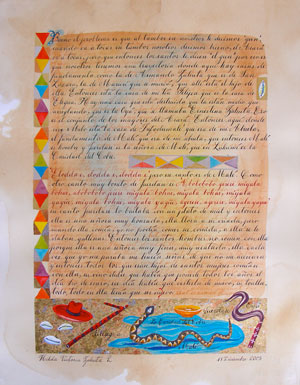Hilda 2

Sumi Ink, metal leaf, and watercolor on paper, 17" X 22"
Hilda Victoria Zulueta, December 18, 2005, Perico Cuba.
Bueno el problema es que al tambor ese nosotros le decimos 'gun', cuando va a tocar ese tambor nosotros decimos bueno, el Arará va a tocar, pero que entonces los santos le dicen 'el gun', por eso es que nosotros tenemos una trayectoria donde aquí hay casas de fundamento como la de Armando Zulueta que es de San Lázaro, la de Maruri que se murió, que ahí está el hijo de ella. Entonces está la casa de mi tía Felipa que es la casa de Elegua. Hay una casa que está destruida que la están medio que arreglando que es la Oyá, que se llamaba Ernestina Zulueta. Eso es el conjunto de los mayores del Arará. Entonces aquí donde vive Melo está la casa de 'tafodumale' que era de mi abuela, el fundamento de Malé que era de mi abuela, que entonces Malé es hombre y Juerdase que es la señora de Malé, que en Lucumí es la Caridad del Cobre.Elodda e, elodda e, elodda e, afimayeda e', pero ese canto es de Malé. Como otro canto muy bonito de Juerdase es 'Abobobobo gerese miyala bohae, abobobobo jerese miyala bohae, miyala bohae, miyala yagüe, miyala bohae, miyala yagüe, agerese, agerese, miyala yagüe' ese canto Juerdase lo bailaba con un plato de miel y entonces ella es una señora muy honrada, ella llora a su criada, pero cuando ella comía, yo no podía comer su comida, a ella se le daban gallinas. Entonces los santos hombres no comen con ella porque ella es una señora muy fina, muy recatada, ella cada vez que yo me paraba me hacía señas de que no me acercara y entonces todos los que eran hijos de santos mujeres comían con ella, su vino dulce que había que ponerle todos los años el día 1ro de enero, ese día había que vestirla de nuevo, su toalla, todo, todo en ella tenía que ser nuevo.
Hilda: Well, the problem is that we call that drum "gun", when drums are going to be played we say, well, Arará is going to play, but then the saints call it "el gun". We have a long tradition here, and there are consecrated houses like Armando Zulueta's , which is for San Lazaro, the house of Maruli, who has died, but her son is still there. Then there is the house of my Aunt Felipa, which is the house of Eleggua. There is a house that belonged to Ernestina Zulueta that was destroyed and is now being remodelled, that is the house of Oyá. Those are the elders in Arará. Then here, where Melo lives is the house of 'tafodumale' that belonged to my grandmother, which is consecrated for Malé. Malé is a man and Juerdase is Malé's wife, who in Lukumi is La Caridad del Cobre (Our Lady of Charity). 'Elodda e, elodda e, elodda e, afimayeda e', that chant belongs to Malé and another beautiful chant for Juerdase is 'Abobobobo gerese miyala bohae, abobobobo jerese miyala bohae, miyala bohae, miyala yagüe, miyala bohae, miyala yagüe, agerese, agerese, miyala yagüe' Juerdase dances that chant with a saucer full of honey. She is a very honorable woman, she cries for her maid, but when she ate, I could not eat her food. They gave her hens. Male deities cannot eat with her because she is very refined, very modest. Every time I stood up she made signs for me not to get close to her. All those who were children of female saints ate with her, her sweet wine that we had to put out for her every year on the first of January. On that day we had to dress her in new clothes, her towel, everything, everything on her had to be new.









